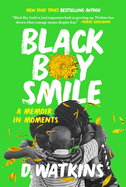
D. Watkins wrote about growing up in east Baltimore in The Cook Up and The Beast Side. In Black Boy Smile: A Memoir in Moments, he dissects what he calls "the lie": codes of Black masculinity that forced him into stoic silence in order to survive his upbringing. Black Boy Smile--a Shelf Awareness Best Book of the Year--feels radical in its openness and its vision of a Black manhood that does not require bottling up feelings of pain or joy.
Watkins recalls a childhood plagued by violence, the collateral effects of the drug trade, and feelings that he didn't know how to process or share. But Black Boy Smile is far from a parade of traumatic memories. Watkins's colorful prose delivers humor and attitude at every turn, particularly in the vivid descriptions--"the stumpy teacher, dressed in three different shades of JC Penney brown"--and in the way he and his friends joke with each other. Some of the most memorable conversations take place between Watkins and Tweety Bird, his friend's girlfriend, whose "heart was bigger than the whole side of east Baltimore." Their playful, teasing exchanges circle around the deeper truth of Watkins's transactional relationships with women, which in turn hints at the loneliness he tries hard to bury.
Watkins finds himself selling drugs and earning a great deal of money, but becoming increasingly miserable. The first hint of a brighter future comes through books. He goes on to attend college: "being Black in an MFA program is kind of like being white in the Black Panther Party." That culture clash leads to some of the book's funniest, most cutting sentences. He finds love in a relationship markedly different from the cold arrangements he once preferred. A particularly moving passage describes Watkins's journey to becoming a father. Through it all, his love for the people of east Baltimore shines through, and Watkins's story is ultimately a hopeful, redemptive one. --Hank Stephenson

